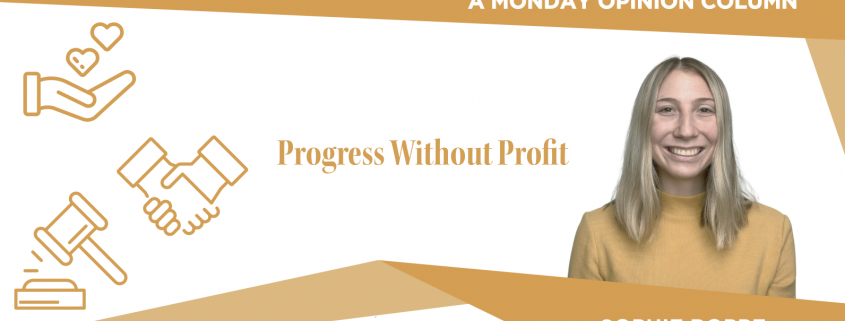Nonprofits are necessary for coronavirus vaccine distribution
Welcome to a new year and a new semester; only two months have passed since my last column, yet if someone told me November 2020 was a lifetime ago, I would believe them. Political science classes certainly have enough material to go over these last two months — from an insurrection at the United States Capitol to a botched coronavirus response, among countless other things.
These events demonstrate how the government is not always a form of reliable support. When the government falters, it is the job of nonprofits to step up to the plate. This is why, similar to last semester, I want to continue to spotlight the role of nonprofits at both a local and national level — starting with one of the rare instances of good news this past year: the beginning of distribution for the Pfizer and Moderna coronavirus vaccines. To ensure both efficient distribution and public trust in the vaccine, the government must rely on the assistance of local nonprofits.
As of Jan. 11, less than 9 million people in the United States had been vaccinated with either the Pfizer or Moderna vaccine, far below the original goal of 20 million Americans vaccinated by the end of 2020 set by Operation Warp Speed.
One reason for this lackluster performance is the minimal federal funding for local health care providers to distribute the vaccine. Local distribution is key to quickly vaccinating hundreds of millions of people, meaning nonprofits must play a logistical role in distribution, especially when it comes to advocating for marginalized communities who may be overlooked in the process.
In Washington D.C., for example, local nonprofit Bread for The City received 400 doses of the Moderna vaccine for distribution for local frontline workers. The nonprofit’s mission is “to “provide food, clothing, medical care, and legal and social services” to low-income communities. Eventually, they hope to be the primary resource for their communities to get vaccinated, as over 3,000 people visit their clinic every year. Nonprofits such as Bread for The City fight to get the people vaccinated who, far too often, whether it be because of race or economic status, do not receive the highest priority.
In Philadelphia, only 40,000 people were vaccinated by the end of the first week of January. At that rate of vaccination, it would take the entire year to vaccinate every person in the city. In response, the local government partnered with the nonprofit Philly Fighting Covid, which will open a mass vaccine clinic in the city’s unused Convention Center. The nonprofit hopes to vaccinate between 1,000 and 4,500 patients every day.
Nonprofits should not only play a role in distributing the vaccine, but also help to establish trust in skeptical communities. According to a USA Today/Suffolk University poll, only 46% of Americans feel comfortable taking the vaccine as soon as they can, an unfortunate statistic when experts believe upwards of 90% of the population need to be vaccinated in order to develop herd immunity against the coronavirus.
Specifically, according to the Nonprofit Quarterly, Black, Native and Latinx Americans might be more hesitant to get vaccinated, a likely consequence considering the long history of racial bias in the medical community. To address this issue, local nonprofits, which have already built relationships and networks in these communities, are better positioned to develop communication frameworks to address the concerns of local members.
An important step to build trust is for the nonprofit staff to reflect their clientele. For example, a rural Indiana nonprofit called The Family Health Clinic of Monon serves a clientele that is 52% Latinx. To build trust with clients, the staff not only speaks Spanish, but the board also mirrors its clients and the organization holds events for its local community. Cultural understanding is key to developing trust, something nonprofits often possess over governmental agencies.
The Chronicle of Philanthropy conducted a preliminary study across Britain, France, Germany and the United States and found that the coronavirus vaccine is more politically charged than past vaccines. With this in mind, it is critical that nonprofits, which often have to remain politically neutral for tax reasons, put full support behind the vaccines to show that taking these vaccines is a matter of health rather than a political statement.
In San Diego, the nonprofit Neighborhood Healthcare recently created a new website and hotline to answer any questions people may have about the coronavirus vaccine. Dr. Jim Schultz, the chief medical officer for Neighborhood Healthcare, explains that the purpose of these tools available to the public is to “emphasize the science behind the vaccine.”
For the distribution of the Moderna and Pfizer vaccines to be as effective as possible, the government cannot act alone. Instead, it is paramount that nonprofits assist with the logistical distribution of the vaccine, while also using established connections to build trust within local communities. Only with the help of nonprofits can we begin the crucial step of putting this pandemic behind us.
Sophie Roppe is a junior writing about nonprofit organizations and social justice. Her column, “Progress Without Profit,” runs every other Monday.

